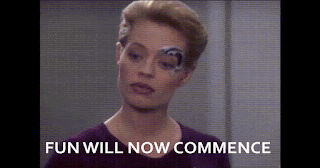Two themes run through Star Trek: Voyager's seasons: praise for space programs and a concentration on "soft" science-fiction.
 Praise for Space Programs
Praise for Space Programs
Praise for space programs crops up in several episodes. These episodes often tell a separate story rather than presenting Voyager
characters/alien species/ship & shuttle craft/weaponry alongside
space phenomenon, battle scenes, crew bonding, the holodeck, visits to
planets, and the Borg.
Of course, these plot points are important! People
turning on the TV (or buying the DVD) to watch Star Trek, expect, well,
Star Trek.
But a little change is also nice. Both of the following episodes are quite good:
"11:59" showcases Kate Mulgrew as one of Captain Janeway's ancestors.
"One Small Step" showcases Phil Morris as the astronaut whose sacrifices impress (even) Seven of Nine.

Both concentrate on the efforts--both mental and physical--that
make the dream of space travel possible. Without being maudlin, they
demonstrate a love for space, "out there," which is touching to watch.
After all, what inspired the creation of Star Trek in the first place!?
"Soft" Science-Fiction
Due to its confined setting and, I would argue, its female captain (because differences between the sexes do exist and that's okay), Voyager has fewer "gadget" episodes than other Star Trek series. I must admit: when characters on Next Generation--which
show I adore--start throwing around sentences about "dilithium crystals
in the space-time continuum that operate on the warp core at
something-something speed for something-something effect due to
something-something plasma injector thingies blah blah blah," I tune
out.
Machine-sci-fi kind of bores me, which likely explains why I can never
get into Arthur C. Clarke and why my interest in Asimov is split right
down the middle of his creations.
Voyager can do the gadget talk, but the series supplies a
healthy amount of "soft" sci-fi: sociological, psychological,
historical, archaeological. The episodes vary considerably but the best
are very good.
 "Survival Instinct" addresses a decision that
Seven-of-Nine made while still a Borg to link a trio of Borgs under her
command. She was terrified by their growing independence, by their
memories of "self." Unlike the three--who were assimilated as
adults--Seven was assimilated as a child. She reacts to her surfacing
memories with knee-jerk fear, demonstrating the very human (but
dangerous) desire for group identity. Someone tell me what to do!
"Survival Instinct" addresses a decision that
Seven-of-Nine made while still a Borg to link a trio of Borgs under her
command. She was terrified by their growing independence, by their
memories of "self." Unlike the three--who were assimilated as
adults--Seven was assimilated as a child. She reacts to her surfacing
memories with knee-jerk fear, demonstrating the very human (but
dangerous) desire for group identity. Someone tell me what to do!
In one of the most extraordinarily thoughtful scenes within sci-fi,
Seven later informs Captain Janeway that for all its faults, the
steadiness she received from the Borg through adolescence is still a
strength to her. She doesn't excuse the Borg or offer it as a way of
controlling nutty teens. But she acknowledges the complex effects of her
prior existence, which becomes more complicated with Unimatrix Zero. A
sociological truth: even the Borg is riddled with differences, mutability, and entropy.
Star Trek: Voyager often comes in for criticism; at its best, its episodes rival even the classics.


No comments:
Post a Comment